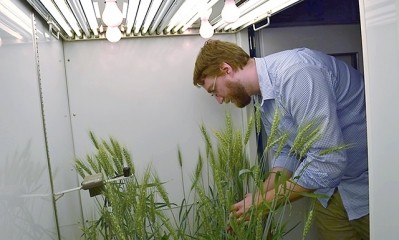Data collection, communication drive ag technology innovation

As more attention is given to the use of devices and digital technology in the feed and animal nutrition or production industries, there is starting to be a shift in how those technologies are developed and how they interact, said Robbie Walker, European growth officer at Alltech who is also involved with the Pearse Lyons Accelerator.
“Three years ago, we saw technology that was picking up data and now it’s, ‘How do we handle that data and democratize that data,’” he told FeedNavigator. “I would predict that once the data is connected we’ll go back to hardware to implement it – micro-dosing systems, back to the precision planters, self-driving feeder mixer wagons – those are the actionable steps in the near future.”
There is increasing interest in biotechnologies that use digital tools and address specific industry challenges including gut health and mycotoxins, he said. Technologies that link to each other and provide the ability to share and use select data also are a focus.
“You could describe them as blockchain-type technologies,” he said. “We don’t think blockchain will be as widely adopted as once thought.”
The volume of data generated by the different players along the production system has the potential to make blockchains “too big, too heavy,” Walker said. The technology of greater interest provides the ability to skim out the data needed and lets users decide which pieces to share and pull only what they want to use.
“The agricultural supply chain has become much better connected and is linking with food – there’s a continuum developing from the premix [producer] to the consumer on the other end,” he said.
The Kentucky-headquartered company started a disruption-focused accelerator in 2016, but is changing how the program functions to adapt, he added. “In 2020 we’re taking a different approach to it.”
Interconnection in ag technology
The last year of the accelerator highlighted the interest in transitioning to technologies focused on data sharing and interconnection, said Walker.
“Initially we saw companies coming in with technology – smart planters, drones and a lot of that was around the agronomy side, and … in year two it moved to dairy and what we’ve found in year three is the startups that are around data sharing,” he said. “It’s more software than hardware and moved into poultry and swine and the two are connected.”
Currently, producers have access to multiple technologies, but the information generated also would be useful to entities “upstream and downstream” in the production process, he said.
Consequently, open-source technology is considered more likely to survive, he said. Systems that allow different devices to interact are more likely to be used.
“From what we’re seeing a lot of the companies are open to collaboration,” said Walker. “So instead of having to buy five or 10 different technologies, [producers] maybe just buy one but all are collaborating in the background.”
Startups working with data systems are starting to be more aware of which platforms they use, he added.
Going forward, there is interest in technology that moves from providing insights to systems that provide actionable information to the correct part of the process, he said. For example, a system that looks at herd nutrition and that provides usable information to the feed mill rather than the farmer.
“The feed mill can act for the farmer, so it becomes a seamless system – but up until now the farmer gets the insight and says, ‘that’s a lot of work for marginal gain,’” Walker said. “When you add them together it’s a large net gain, [and] it’s rapidly become more effective.
“And it only works if there is sharing of data – what is going to win out is the technology that collaborates and the digital technology that enables the collaboration,” he added.
Disrupting feed mills
“What’s happening now is there is increasing technology being developed for processors, and retailers, and consumers but we’ve seen little being developed for feed mills,” said Walker.
However, within the production system, feed mills may be the ripest for disruption, he said.
“If they don’t embrace modern technology … and business models they do face extinction,” he said. “The feed mills that jump on board with new technology and business models will have great success, but not only that, they’ll become integral parts of the supply chain and have lobbying power over the decisions and directions of that agri-food supply chain.”
As the industry moves from using systems designed in the 1950s, change will mean more than bolting on new technology, he said. There will need to be fundamental shifts in business models.
Moving from accelerator to partnership
As conditions within the industry change, Alltech is also altering its accelerator program to adapt, said Walker.
Since the launch of the Pearse Lyons Accelerator there has been an “explosion” of accelerators addressing the feed and animal production industries, he said.
Previously, Alltech had looked for startup companies that were interesting and disruptive, he said. “Now instead of bringing people through a structured, set number of gates where they’re exposed to mentorship and other industry challenges, we’re looking for companies we can collaborate with.”
The focus will be much more “niche” and in line with the company’s core competencies or where Alltech would like to play a dominant role, he said. Companies of interest will be invited to accelerate with Alltech.
“It’s always on, so it’s not just a program that starts on a date and ends on a date,” said Walker. “We’re putting the call out in much more niche [area] than previously – rather than taking a broad cross-section of what is out there.
“It’s an approach that’s going to lead to partnerships – from loose collaboration all the way through to actual share ownership and anything in between,” he added.
The new program is intended to provide a more thorough look at the work another company is doing, he said.
“The first thing we’ll do is a pilot project,” he said. That will establish if the idea is workable and how it relates to the current production industry.














